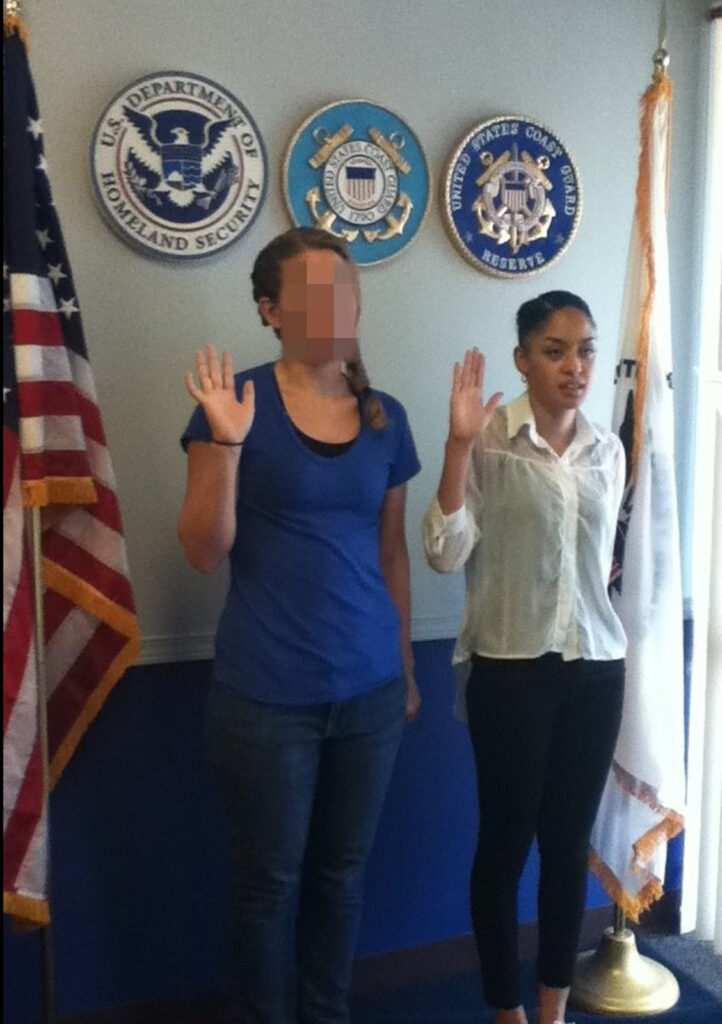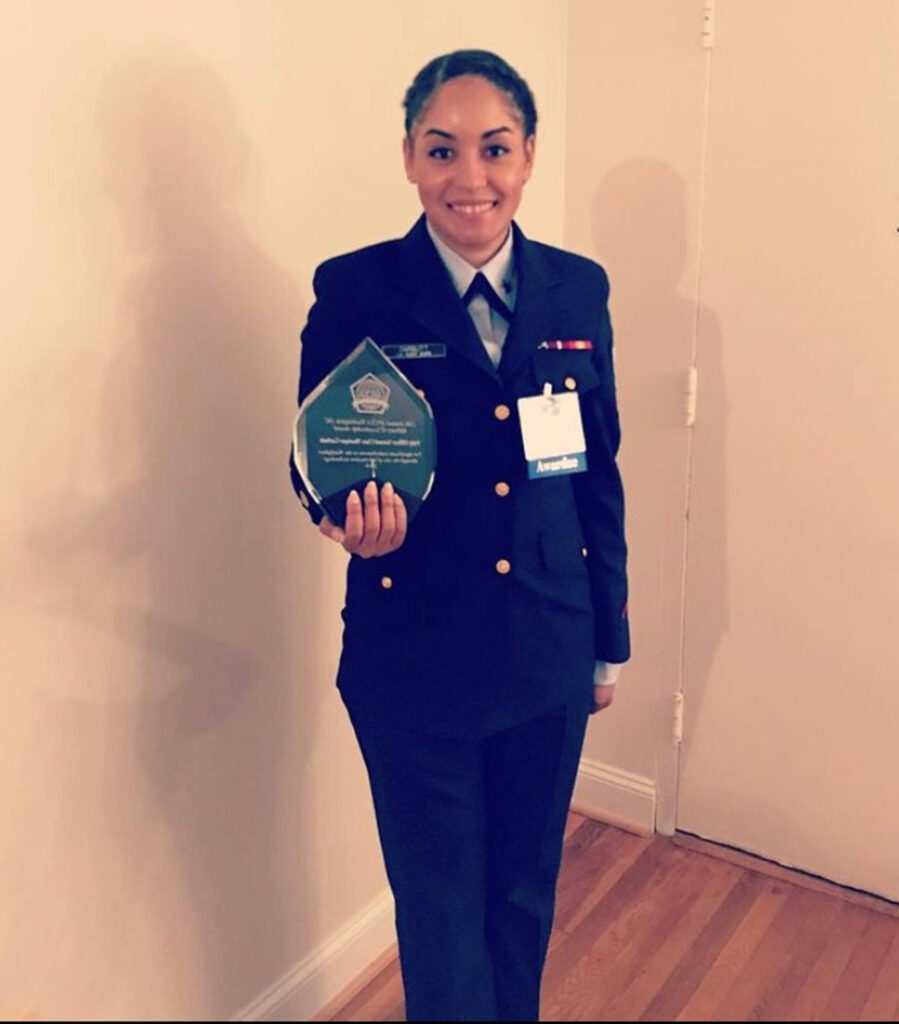When she joined in 2013, Monique Garbutt embodied much of what Coast Guard leadership wants in today’s service — a hard-working, college-educated, tech-savvy African American woman who brought skill and diversity to the ranks.
She exited in just six years after a man she said sexually assaulted her received a light penalty and she fought to find out why.
“I trusted the system, I did,” said Garbutt, choking back tears. “There’s a difference between justice and pacification, and what they gave me was pacification.”
Her promising career as an IT network expert at the Cyber Command in the nation’s capital came to a crashing halt after she reported that she was assaulted at a Coast Guard wedding in May 2017. Pressing her case brought retaliation that ended her career, she insists.

Garbutt was one of more than 70 people who reached out to tell their stories after reading “Silenced No More,” a series by McClatchy and the Miami Herald in July. It spotlighted sexual harassment of members of the Coast Guard and retaliation against those who seek redress.
An active duty service member saw the stories, and sent her a link to the one about Claude Morrissey, a decorated rescue swimmer whose career nosedived after his wife reported inappropriate touching by his superior.
“When I read that story, I was like, ‘Oh my. It’s such a small service, I can’t understand why it can’t be fixed,’” Garbutt said.
CAREER HOPES
The daughter of Caribbean immigrants, Garbutt was 22 when she enlisted in the Coast Guard in May 2013 after finishing college. She did her training at a New Jersey boot camp in Cape May and then was assigned to the Florida Keys in Islamorada, where she was involved in search-and-rescue operations.
In 2015 she was sent to Petaluma, California, for IT training and in November that year moved to the suburbs of Washington, D.C. She helped with the transmission of secure communications and monitored Coast Guard computer networks to thwart would-be cyber intruders from breaching communications on vessels and at bases across the globe.
Life was good. Until a fateful night in Warrington, Pennsylvania, when she and other Coasties, as service members call themselves, gathered to attend a wedding of one of their own.
Garbutt was a bridesmaid. A service member she met in Petaluma and trusted plied her with alcohol throughout the night, not drinking himself, she said. The next thing Garbutt remembers is waking up in her hotel room in the overnight hours, the man without pants on.

“It was someone I went to training school with, someone they all knew well. That’s why it caught me so off guard that someone would do that,” she recalled.
The next day, after suffering a panic attack, Garbutt reported the incident to senior leadership in what’s called an unrestricted report. That is a more public form of reporting that automatically triggers an investigation and involves the command structure.
“In the beginning I felt a weight was off my chest, but things started going downhill,” she said.
SLIPPERY SLOPE
More than 48 hours after the incident, she was sent to a military hospital in Fort Belvoir for a rape evaluation, where they did not have the specific personnel needed for a forensic rape evaluation. Out of concerns about preserving evidence, the Coast Guard-assigned victims advocate took her to another local hospital in Virginia for a rape evaluation. Much later, Garbutt learned that nurses at Fort Belvoir had incorrectly put in her report that she refused treatment.
Garbutt was ordered to stay home while an investigation by the Coast Guard Investigative Service, or CGIS, began. Her laptop and phone and those of others at the wedding were taken so investigators could copy emails, texts and other forms of communications. Witnesses were interviewed.
“From there, I was like, ‘The Coast Guard is handling this,’” she said.
But days turned into weeks, then weeks into months. In late November 2017 she got the bad news.
“They said, ‘you don’t have enough evidence. This is a he said/she said ordeal,’” Garbutt recalls, her voice quavering as she told how she was asked to accept a plea deal for simple assault.”
FACTS AFTERWARD
In response to written questions about Garbutt’s case, the Coast Guard said the accused man waived his rights and initially spoke with investigators. But he did not provide consent to search his phone, and a search warrant was obtained to do so. Eventually, he was charged with sexual assault and abusive sexual contact, reduced at trial to simple assault.

While disputing some of Garbutt’s claims, spokesman Lt. Cmdr. Scott McBride said the service was “deeply saddened” by any report of sexual assault.
“Sexual assault is a crime, is unacceptable, and goes against the core values of the Coast Guard,” he said. “It harms individuals in multiple ways, affects our mission readiness, and erodes public trust in the armed forces.”
The matter in May 2018 went to a general court martial proceeding, akin to a felony case in the civilian world. Garbutt admits she lost control when he walked into the courtroom and was escorted out and not present when the man’s plea deal was accepted and he was given 30 days in the brig for simple assault and an “other-than-honorable” discharge.
The sexual nature of the assault would not openly follow him into the civilian world.
Some of Garbutt’s colleagues remain upset about what happened, and the aftermath.
“I was shocked, because she is one of the smartest IT’s that I knew in the Coast Guard cyber command at that time. To learn what happened and why it’s happened … was mind blowing,” said one active duty service member who watched Garbutt’s professional demise unfold and asked to remain anonymous because of prohibitions on speaking to the news media.
SEARCH FOR FACTS
In the aftermath, Garbutt’s anger turned to obsession.
“My sole purpose was to go and get a copy of the investigative report,” she recalls. “After the court date I had the biggest runaround to get a copy of the criminal investigation, just to get my hospital records. She filed a Freedom of Information Act request in November 2018 for her files, and finally got her documents in March 2019, after the pro-bono group Protect Our Veterans interceded on her behalf.
As suspected, she said, there was more in there than she was told. McClatchy and the Miami Herald obtained a copy of the files she received. Far from a he said/she said, they show the man acknowledging in broad terms his wrongdoing.
“What I saw in there, it just made me want to throw up. He doesn’t confess to everything. But he confessed to way more than simple assault,” Garbutt said, noting she learned through the records that the assault appeared premeditated as he was messaging a friend in St. Louis about what he was going to do. “There is so much damaging stuff that is all in there that I felt this whole thing I was dragged through was a lie.”
Those were on top of the texts that she already had from the man.
“I think there is something wrong with me. I am going to talk with someone about it,” he tells her by text. At another point, he acknowledges inappropriate sexual behavior but pleads with her “please don’t ruin me.”
The CGIS report shows both sides agreed she was very intoxicated, to the point of vomiting in the hotel bathroom. He booked the room at a Hampton Inn with a queen-size bed. She thought they’d each have their own bed. The report showed how the man communicated in real time by Skype over the Coast Guard network with a friend who knew her about having sex with her, saying his “chances are high if I play it right.”
Garbutt testified that she regained her senses in the overnight hours, sick and sweaty, and that at least twice thought she felt something touching her private parts. The report shows the man later confessed he fondled her breasts and put his hand below her waistline while she slept but denied doing more than that.
She feels more than that happened, but it was more than 48 hours later that she got a rape test and she never saw actual results.
“I never saw my own rape kit results, and to this day I have not seen them,” she said. “I want to see it on paper that it was inconclusive!”
The Coast Guard, in the report and its response to questions, noted that the man’s DNA was not found on her undergarments or on swabs.
THANKS, GOODBYE
Making matters worse, in March 2019 Garbutt received an email notifying her of what’s called a Separation for the Convenience of Government. This administrative-discharge designation — uncommon and used at the discretion of command — is a nice way of saying the Coast Guard no longer needs you.
“I was gobsmacked,” she said. “Why is this happening?”
She felt she must have upset someone higher in the chain of command to be forcibly separated from a career she loved, and wondered if it was retaliation.
The Coast Guard disputes that she was retaliated against, noting that several documents show she chose to extend her date of departure, a sign that it was voluntary. A spokesman added she can still reenlist since hers was an honorable discharge.
A psychological evaluation from April 2019, however, describes signs of post-traumatic stress disorder and said Garbutt was in “a clear state of distress due to being separated from the USCG.”
Garbutt eventually learned that she was being discharged for failing to attend a training program, which would have required her to move away for months, something that was prohibited by the ongoing investigation into her complaint.
She’d been completing a master’s degree, and on top of the assault the separation was an unwelcome distraction.
Garbutt, 30, insists hers was an involuntary separation, and provided paperwork documenting that, which her superiors signed off on it.
When she left in June 2019, it was just months after she represented the Coast Guard in winning a special military IT award from the prestigious trade association AFCEA International.
INDEPENDENCE QUESTIONED
Garbutt and some active service members echoed the view of subjects featured in the other “Silenced No More” stories that someone independent of the Coast Guard needs to handle alleged sexual assault and harassment. The idea of an independent body has been circling in Congress for years, discussed most recently in 2019, but the Coast Guard opposes it.
“Investigations, audits, and other interventions outside of the Coast Guard from Congress and the DHS Inspector General, have repeatedly shown that the Coast Guard is incapable of adhering to its own workplace policies and federal discrimination laws, such as, the Military Whistleblower Protection Act,” said Lt. Cmdr. Kimberly Young-McLear, whose own complaint and retaliation were the subject of an inspector general’s report at the Department of Homeland Security and a congressional hearing. “Talented people in the workforce continue to suffer tremendously because the Coast Guard is not adequately conducting fair and impartial investigations, to include holding perpetrators accountable.”
Outside investigations are needed, agreed one of Garbutt’s superior, who spoke on condition of anonymity.
“I think there definitely should be an outside body, because what I am finding from a lot of people who have had situations is that the Coast Guard is looking out for itself, even your senior ranking officials are looking out for their career,” said the veteran active-duty member.
The Coast Guard is the smallest of the armed services and has resisted anything that weakens the authority and discretion of the command structure. It found itself under attack in December 2019 after a congressional report, “Righting the Ship,” called for changes in how the service handles complaints of bullying, harassment, retaliation and discrimination.
To the ire of lawmakers, Adm. Karl Schultz, the commandant, declined to testify on the report at a congressional hearing and sent the service’s human-resources chief in his place.
In a letter to Congress in late October, the commandant, said the service had implemented all the recommendations from both the congressional and inspector general reports, and said it would serve “as the floor and not the ceiling in our continued progress.”
Even as the commandant offered the cheery outlook, the DHS inspector general posted an unusual five-paragraph statement on Dec. 17 on its website. It said that “based on a preponderance of the evidence” it had concluded superiors had retaliated against a whistleblower and denied career advancement.
The agency offered few details, but said it had advised the acting secretary. Member of Congress confirmed they had not been notified.
This was a similar conclusion to a probe involving Young-McLear’s complaints. An 18-year Coast Guard veteran, she sympathized with Garbutt and said in an interview this week that more still needs to be done.
“The culture of the Coast Guard has not improved since I publicly testified on Capitol Hill in 2019. I testified as an active duty whistleblower because I urgently wanted to break this cycle of harm, which is perpetuated by the highest levels of leadership,” she said, pointing to people like Garbutt whom the Coast Guard has invested in. “We lose tremendous talent from all career fields, in large part because the Coast Guard continually rewards and protects perpetrators, instead of ensuring there is equity and justice. All employees, including cadets and officer candidates, deserve to have careers free from any type of bullying, harassment, sexual assault, or retaliation.”
___
© 2020 Miami Herald Distributed by Tribune Content Agency, LLC.



